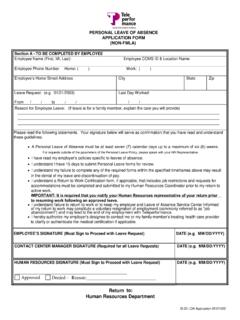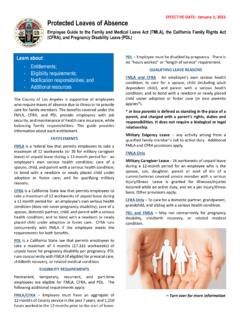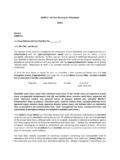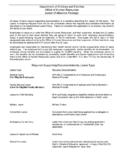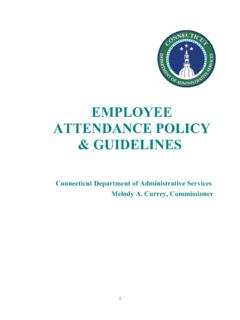Transcription of ATTENDANCE (ABSENTEEISM AND TARDINESS) - Idaho
1 ATTENDANCE (ABSENTEEISM AND TARDINESS) POLICY The purpose of this policy is to provide a fair, consistent, and effective method of monitoring employee ATTENDANCE in order to help maintain efficient operations. Good ATTENDANCE habits are integral part of every employee s job. Habitual tardiness and unscheduled absenteeism is unprofessional and puts a burden on co-workers and clients. It is therefore the policy of the EIPH that all employees practice good ATTENDANCE habits. Generally, EIPH s employees work Monday through Friday from 8:00 to 5:00 with the exception of designated holidays. However, due to the nature of our business, there may be instances that employees are required to work shifts that are outside of these general business hours (extended clinic hours, special clinics, trainings, community events, etc). As much as possible, employees will be given advance notice when they will be required to work outside of their normal work hours.
2 In addition, there are situations that an employee may be granted an adjusted work schedule, dependent on the needs of the agency. Any schedule adjustment is up to the discretion of the Division Director. Any approved schedule adjustments must be reported to the District Director and Human Resource Specialist. PROCEDURE Perfect ATTENDANCE is desirable in the interest of efficient workflow and fairness to co-workers; however, there are instances where absences or late arrivals to work may be unavoidable. A habitual pattern of failure to report for duty at the assigned time or place will result in disciplinary action up to and including dismissal from employment. Definitions: Scheduled absence - An absence that is known, requested, and approved in advance by the employee s supervisor (or designee). Examples include, but are not limited to, approved leave (vacation, compensation time, sick, or leave without pay).
3 Unscheduled absence - An absence that occurs suddenly and is taken without advance notification or approval. Examples include, but are not limited to, an unplanned illness, the failure to report to work as scheduled, tardiness, leaving a post early, or abandoning a post or job. An employee may be asked to provide a doctor s certification of illness or injury for absences in excess of three (3) days, or for periods of less than three (3) consecutive working days whenever a supervisor believes it is warranted (Rule ). Any employee who is on approved sick leave and is found to be improperly using that sick leave shall be subject to disciplinary action up to and including dismissal (Rule 190). employee RESPONSIBILITY 1. Employees are responsible to be at their work station on time as scheduled and prepared to work. (For example, if your shift starts at 8:00 , you are expected to be at your assigned station ready to begin work at 8:00 , not walking in the door at 8:00 ).
4 An employee is tardy when he/she arrives at the assigned work station after the scheduled start time. 2. Maintain a consistent and reliable level of ATTENDANCE . 3. Know and follow the notification requirements of their division for reporting absence or tardiness. Notification requirements include: whom to notify, how to notify (such as email, phone, text, or similar), and timeline for notification. 4. Accurately report in I-Time all work performed and leave time. 5. Request time off as far in advance as possible. 6. Don t work beyond your scheduled hours unless you have been given permission from your supervisor, except in emergency situations. 7. Remain at their work station unless the needs of the job require being elsewhere, except during authorized breaks (including restroom breaks). 8. Remain at work during entire work schedule, unless excused by their supervisor. DIRECTOR/SUPERVISOR RESPONSIBILITY 1.
5 Manage work schedules and leave requests of employees. Be aware of employee s leave accrual when approving leave requests. 2. Post or make known to division employees the notification requirements of the division. Notification requirements include: whom to notify, how to notify (such as email, phone, text or similar), and timeline for notification. 3. Address employee ATTENDANCE issues promptly and investigate suspected ATTENDANCE -related performance issues, such as excessive absence or tardiness, and take appropriate action in a timely manner. 4. Train employees to ensure all staff are knowledgeable about the ATTENDANCE policy. 5. Notify Human Resources of staff who has consecutive absences over three days. This does not apply to pre-planned vacation. EXCEPTIONS Corrective action against an employee , up to and including dismissal, may be taken to resolve issues with the employee s ATTENDANCE based on the unique characteristics of each case and the presence or absence of other work-related problems.
6 If the absence is authorized under the Family Medical Leave Act (FMLA), an employee shall not be considered as having excessive absenteeism. Except for those employees on authorized leave, an employee who has not returned to work within five working days after approved paid or unpaid leave or release by their medical provider shall be considered as having voluntarily separated. (IDAPA ) Return to Table of Contents BREASTFEEDING MOTHERS REASONABLE BREAK TIME EIPH shall provide reasonable break time for an employee to nurse or express breast milk for her nursing child for up to one year after the child s birth. EIPH shall provide a place, other than a bathroom, that is shielded from view and free from intrusion from coworkers and the public, which may be used for this purpose. EIPH shall not be required to compensate an employee who exceeds reasonable break times for this purpose.
7 Time allowed for nursing or expressing breast milk will be based on management decision. Breaks of more than 20 minutes will be unpaid. Return to Table of Contents


